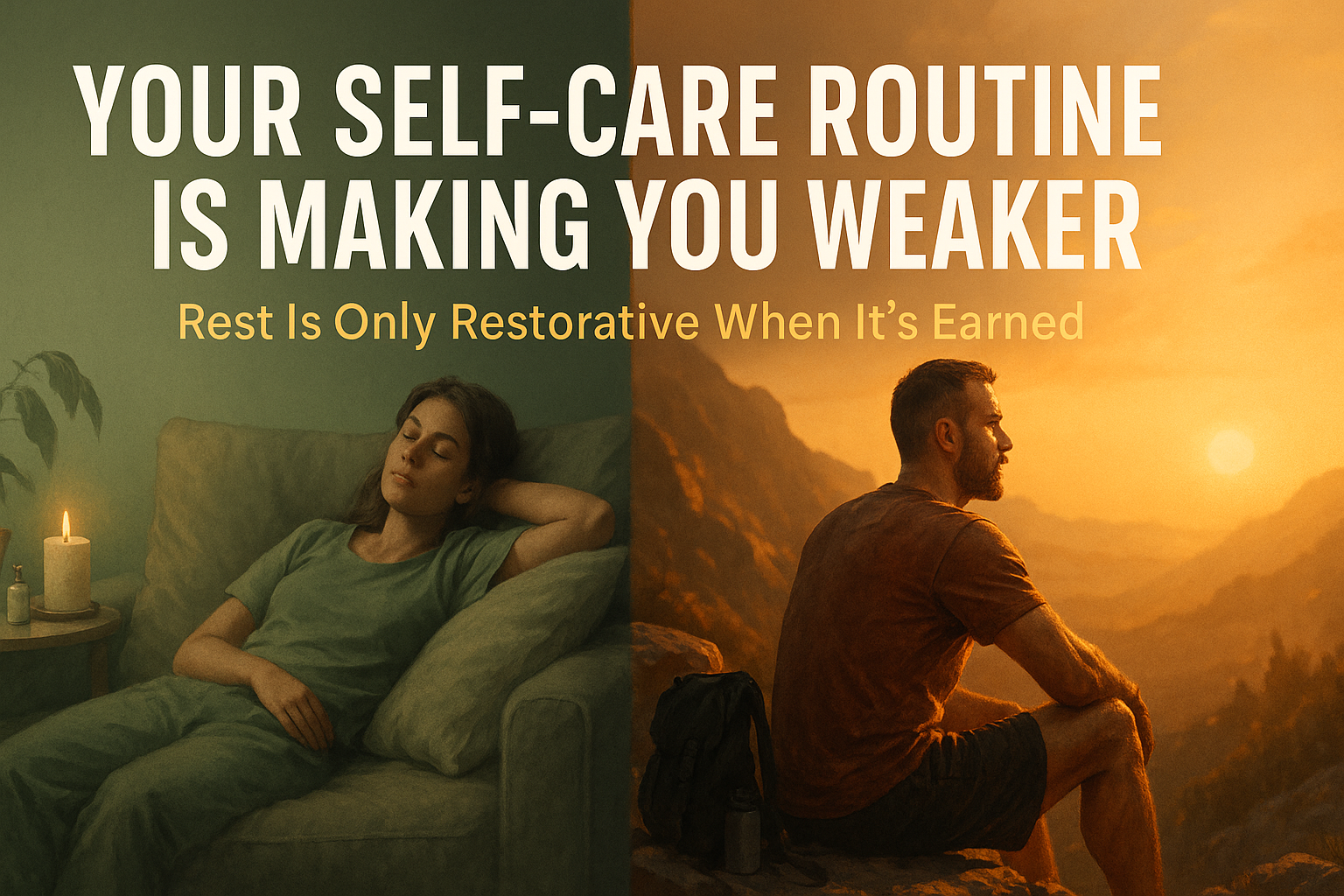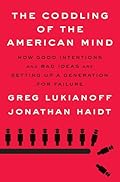
Your Self-Care Routine Is Making You Weaker
By Derek Neighbors on November 1, 2025
Rest is only restorative when it’s earned. Without the depletion, there’s nothing to restore.
The Myth We’re Sold
I was standing in line at a coffee shop last Tuesday morning when I overheard the conversation that crystallized something I’d been noticing for months.
“I’m taking a mental health day tomorrow,” one woman said to another. “I just really need to rest.”
The other nodded sympathetically. “You absolutely should. Self-care isn’t selfish.”
Here’s what struck me: The woman looked exhausted. But not the exhausted that comes from pushing yourself toward something difficult. The exhausted that comes from constant low-grade avoidance of what actually matters.
She went on to describe her elaborate morning routine, her evening wind-down protocol, her weekend recovery practices. An entire architecture built around rest and restoration. For what? What had she been exerting herself toward that required this level of recovery?
Modern self-care culture has sold us a beautiful lie: that rest is always restorative, that you always deserve it, that caring for yourself means constant accommodation of comfort.
The result isn’t resilience. The result is people who need more support to handle less challenge.
The Reality Your Body Knows
Here’s what nobody wants to say about modern self-care culture: most of it is producing weaker people, not stronger ones.
Not because rest is bad. Rest is essential. But rest without preceding exertion doesn’t restore anything. It just trains your body and mind that comfort is the baseline, and any deviation from comfort is a crisis requiring immediate intervention.
Your body knows the difference between two types of exhaustion:
The exhaustion that comes from genuinely pushing yourself toward something difficult. From doing the hard conversation. From completing the challenging project. From training past your current limits. This exhaustion serves you. Your body recognizes it as depletion that requires restoration.
The exhaustion that comes from avoiding what you need to face. From endless scrolling. From performative busy-ness that produces nothing. From constant mental gymnastics to justify why today isn’t the day. This exhaustion destroys you. Your body recognizes it as the cost of running from yourself.
Rest after the first type restores. Rest after the second type just postpones the reckoning.
The problem with modern self-care culture is that it doesn’t distinguish between them. It treats all exhaustion as equivalent and prescribes the same solution: more comfort, more accommodation, more rest.
So you get people with elaborate morning routines who accomplish nothing meaningful by noon. Wellness protocols that consume hours but produce no actual capacity for difficulty. “Mental health days” taken on Monday morning after a weekend of doing nothing that mattered.
The tragic irony: the more they focus on self-care, the weaker they become. Not because they’re doing something wrong. Because they’re doing something fundamentally backwards.
The Hidden Cost Nobody Mentions
The real danger of unearned rest isn’t that you waste time. It’s that you progressively train yourself to need more support for less challenge.
Every time you reach for comfort without having first faced difficulty, you send your nervous system a message: this is a crisis. Every time you prioritize rest over exertion, you teach your body that any discomfort is unacceptable.
The adaptation is exactly what you’d expect: you become less capable of handling difficulty. Not because you’re broken. Because you’re well-adapted to the environment you’ve created. An environment where comfort is the default and discomfort is the exception.
This manifests in ways that would be comedic if they weren’t so tragic:
The person who spends 90 minutes on their morning routine but can’t handle a difficult email. The team that needs a recovery period after a moderately challenging project.
Modern culture celebrates this as “setting boundaries” and “honoring your limits.” Sometimes it is. Often it’s weakness masquerading as wisdom.
The Greeks had concepts for what we’re losing here:
ponos meant toil or labor. Not as punishment, but as the necessary precursor to genuine capacity. They understood that strength comes from struggle, not from its absence.
arete meant excellence as a way of being. Not something you achieve once and maintain through comfort, but something you earn daily through effort and discipline.
sophrosyne meant self-control, but not as deprivation. As understanding the difference between what truly serves you and what merely comforts you in the moment.
Rest without preceding ponos doesn’t restore arete. It just creates the illusion of self-control while cultivating actual fragility.
What Actually Works
The earned rest principle is simple: rest is only restorative when preceded by genuine exertion.
This isn’t about being harder on yourself. It’s about being honest about what your body and mind actually need.
When you push yourself genuinely toward something difficult, your body depletes specific resources. Physical exertion depletes muscle glycogen and creates micro-tears that need repair. Mental exertion depletes glucose and neurotransmitters. Emotional challenge depletes your capacity for regulation.
Rest after genuine depletion allows your body to restore and adapt. This is the foundation of all growth. You stress the system genuinely, then you allow recovery. The system comes back stronger.
But when you “rest” without genuine preceding depletion, there’s nothing to restore. Your body isn’t recovering from effort. It’s just existing in a state of permanent under-challenge. The adaptation isn’t strength. It’s the progressive loss of capacity.
Here’s what shifts when you understand this:
That morning routine stops being the foundation of your day and becomes the reward after genuine work. The elaborate wind-down becomes meaningful when it’s actually helping you recover from real effort. The “mental health day” transforms from avoidance into genuine restoration.
More importantly: the rest starts to feel different. Earned rest has a quality that unearned rest never achieves. It’s guilt-free. It’s satisfying. It’s genuinely restorative because there’s something real to restore.
Meanwhile, unearned rest carries this background hum of anxiety and guilt. Because your body knows. You haven’t depleted anything real. You’re not recovering. You’re just hiding.
The Shift That Changes Everything
Making this shift isn’t complicated, but it’s not comfortable:
First, audit your exhaustion honestly. Not the story you tell yourself, but the truth. Are you tired from pushing toward something difficult, or tired from avoiding it? Are you depleted from genuine exertion, or from the constant mental load of justifying why you’re not exerting yourself?
Second, earn your rest. Before you reach for the comfort routine, ask: What have I genuinely pushed toward today that requires recovery? If the answer is nothing, don’t rest. Push into something difficult first. Do the hard conversation. Face the challenging work. Move your body to genuine fatigue. Then rest deliberately.
Third, notice the difference. Pay attention to how earned rest feels versus unearned rest. Earned rest is satisfying, restorative, guilt-free. Unearned rest comes with this background noise of anxiety and avoidance. Your body is telling you something.
Fourth, build the cycle deliberately. Exertion → Earned Rest → Greater Capacity. This is how all development works. Not comfort → more comfort → fragility. But challenge → restoration → increased capacity for challenge.
This will be uncomfortable at first. Your nervous system has been trained to treat any discomfort as a crisis. The first time you push into genuine difficulty, every fiber of your being will scream that you need to stop, that this isn’t okay, that you need immediate comfort.
That voice is lying. It’s the voice of cultivated fragility, not genuine limitation.
Endure the discomfort. Then earn the kind of rest that reminds you who you are. That’s what your body was designed for.
The Questions You Need to Ask
Before you reach for your next self-care practice, get honest with yourself:
When was the last time I was genuinely exhausted from pushing toward something difficult?
Does my rest actually restore me, or does it just postpone what I’m avoiding?
Am I becoming progressively more capable or more fragile?
What am I avoiding that’s masquerading as self-care?
If I stripped away all the self-care routines, what would I be forced to face?
These aren’t comfortable questions. They’re not supposed to be. Comfortable questions get you comfortable answers, which get you comfortable results. Which means nothing actually changes.
Final Thoughts
Your self-care routine might be your most elaborate avoidance mechanism.
Not because taking care of yourself is wrong. Because the modern version of self-care has become about constant comfort instead of earned restoration. About treating any discomfort as unacceptable instead of understanding that genuine growth requires genuine challenge.
Real self-care looks different. It means doing the hard thing now so that rest can actually restore you later. It means pushing into genuine difficulty so that recovery has something real to work with. It means building capacity through challenge, not losing it through constant accommodation.
Excellence doesn’t come from comfort. It comes from understanding that rest serves the work, not the other way around. That restoration requires preceding depletion. That you don’t become stronger by needing less challenge, but by handling more of it.
The ancient Greeks understood something we’ve forgotten: ponos (toil) isn’t punishment. It’s the prerequisite for arete (excellence). Remove the difficulty, and the rest has nothing to restore. You don’t become stronger. You become progressively weaker while telling yourself you’re practicing self-care.
The shift is simple but not easy: earn your rest. Push into something genuinely difficult. Then let your body do what it’s designed to do. Restore. Adapt. Grow stronger.
That’s self-care. The rest is avoidance.
Ready to make earned rest a practice, not just a philosophy? MasteryLab is where this principle becomes a daily rhythm, forged with others who refuse to settle for comfortable weakness.



